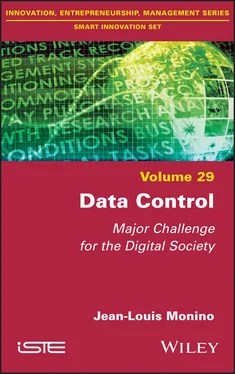Jean-Louis Monino - Data Control
Здесь есть возможность читать онлайн «Jean-Louis Monino - Data Control» — ознакомительный отрывок электронной книги совершенно бесплатно, а после прочтения отрывка купить полную версию. В некоторых случаях можно слушать аудио, скачать через торрент в формате fb2 и присутствует краткое содержание. Жанр: unrecognised, на английском языке. Описание произведения, (предисловие) а так же отзывы посетителей доступны на портале библиотеки ЛибКат.
- Название:Data Control
- Автор:
- Жанр:
- Год:неизвестен
- ISBN:нет данных
- Рейтинг книги:3 / 5. Голосов: 1
-
Избранное:Добавить в избранное
- Отзывы:
-
Ваша оценка:
- 60
- 1
- 2
- 3
- 4
- 5
Data Control: краткое содержание, описание и аннотация
Предлагаем к чтению аннотацию, описание, краткое содержание или предисловие (зависит от того, что написал сам автор книги «Data Control»). Если вы не нашли необходимую информацию о книге — напишите в комментариях, мы постараемся отыскать её.
Data Control — читать онлайн ознакомительный отрывок
Ниже представлен текст книги, разбитый по страницам. Система сохранения места последней прочитанной страницы, позволяет с удобством читать онлайн бесплатно книгу «Data Control», без необходимости каждый раз заново искать на чём Вы остановились. Поставьте закладку, и сможете в любой момент перейти на страницу, на которой закончили чтение.
Интервал:
Закладка:
65 49
66 50
67 51
68 52
69 53
70 54
71 55
72 56
73 57
74 58
75 59
76 60
77 61
78 62
79 63
80 64
81 65
82 66
83 67
84 68
85 69
86 70
87 71
88 72
89 73
90 74
91 75
92 76
93 77
94 78
95 79
96 80
97 81
98 82
99 83
100 84
101 85
102 86
103 87
104 88
105 89
106 90
107 91
108 92
109 93
110 94
111 95
112 96
113 97
114 98
115 99
116 100
117 101
118 102
119 103
120 104
121 105
122 106
123 107
124 108
125 109
126 110
127 111
128 112
129 113
130 114
131 115
132 116
133 117
134 118
135 119
136 120
137 121
138 122
139 123
140 124
141 125
142 126
143 127
144 128
145 129
146 130
147 131
148 132
149 133
150 134
151 135
152 136
153 137
154 138
155 139
156 140
157 141
158 142
159 143
160 144
161 145
162 146
163 147
164 148
165 149
166 150
167 151
168 152
169 153
170 154
171 155
172 156
173 157
174 158
175 159
176 160
177 161
178 162
179 163
180 164
181 165
182 166
183 167
184 168
185 169
186 170
187 171
188 172
189 173
190 174
191 175
Smart Innovation Setcoordinated by Dimitri Uzunidis
Volume 29
Data Control
Major Challenge for the Digital Society
Jean-Louis Monino

First published 2020 in Great Britain and the United States by ISTE Ltd and John Wiley & Sons, Inc.
Apart from any fair dealing for the purposes of research or private study, or criticism or review, as permitted under the Copyright, Designs and Patents Act 1988, this publication may only be reproduced, stored or transmitted, in any form or by any means, with the prior permission in writing of the publishers, or in the case of reprographic reproduction in accordance with the terms and licenses issued by the CLA. Enquiries concerning reproduction outside these terms should be sent to the publishers at the undermentioned address:
ISTE Ltd
27-37 St George’s Road
London SW19 4EU
UK
www.iste.co.uk
John Wiley & Sons, Inc
111 River Street
Hoboken, NJ 07030
USA
www.wiley.com
© ISTE Ltd 2020
The rights of Jean-Louis Monino to be identified as the author of this work have been asserted by him in accordance with the Copyright, Designs and Patents Act 1988.
Library of Congress Control Number: 2020938410
British Library Cataloguing-in-Publication Data
A CIP record for this book is available from the British Library
ISBN 978-1-78630-550-3
Foreword
In the fight against waste, one particular commodity, however eminently precious, is rarely mentioned: data.
While it is not a priority, it is first collected to serve as, or illustrate, a reasoning or an idea. The major challenge of the last two decades has refocused on another field: that of understanding and analysis. Offering a clear report facilitates the management and steering of an activity.
Data processing opens the door to strategic recommendation. Now that the value of data is known, its value can further improve, provided it is operational and ready to use.
The individual, the consumer and the voter are regularly solicited, sometimes against their will, often in ignorance of the risks involved. In the face of the abuses that have been noted, the law has had to be involved.
Before this stage of maturity, “just in case” storage is reassuring without really knowing why. This intuition leads companies to sometimes accumulate incomplete or unorganized data. Ignorance of its purpose has resulted in the accumulation of data in huge volumes, with the only limit being the technical constraints of the moment, the cost per byte.
So far, it has been impossible to use all this data due to lack of time and resources. Therefore, it is not possible to educate the overall population. Using a sample is imperative, with representativeness being a key concept.
Technological progress has made it possible to overcome this constraint of representativeness. The entire dataset is now vulnerable to attack even though the size is discouraging. These masses of data, veritable “assembled pieces”, have whetted the appetite of the greedy known as Big Data, machine learning, artificial intelligence and other “datavores”, reinventing a 2.0 statistic: data science.
At the same time, the proliferation of equipment (tools, applications) has democratized the use of data, making connection and leading to automatic and endemic branches. The variety of media (computers, tablets, smartphones), the explosion of networks and access providers facilitate the exchange, sharing and processing of information. Mobile consumption has become instantaneous.
This continuous feeding creates a new addiction, a demand of a different nature. In order to respond before it becomes obsolete, it is necessary to move quickly, even if it means returning the information to its original role as simple data. In this sense, pre-selections are made, and the data is delivered, sorted and “ready to read”, not necessarily ready to use. The preferences and tastes of the “target” are identified; its supposedly known expectations are identified in relation to its history. Trespassing?
However, the absence of filters or segmentation leads to fears of saturation. The data is ubiquitous despite its limited lifespan. It is refreshed and constantly updated. The required reactivity sometimes weighs on its quality. The corollary concession is the “average” information, which is difficult to exploit. It is against this risk of drowning or submersion that analysts, true lifeguards, fight. Their responsibilities are cleaning, reducing and synthesizing data; detailing or refocusing it if necessary; and using it in the delegated question. At the heart of the process, this human presence guarantees the surpassing of a simple mechanical treatment and therefore the creation of value. The mission of the latter consists, after all the stages of data processing, of restoring the true dimension of the data while making it profitable.
Here, Professor Monino's book brings the main tools that are indispensable to his mission, which, in the course of time, will become more and more indispensable. Unfortunately, not all companies have the necessary resources (time, budget, analyst) to extract or exploit this wealth. However, the use of specialists such as E2S-Conseils allows us to make the most of this information to help companies develop and flourish.
I hope that you enjoy reading and learning from this book.
Philippe RIBIERE
Chief Executive Officer
E2S-Conseils
Acknowledgements
I wish to dedicate this book to my sister who unfortunately was unable to read my work on data.
Also, all the members of the “ Réseau de Recherche sur l'Innovation ”, RRI, and in particular, Dimitri Uzunidis, who encouraged me to publish this work and I thank him warmly for his encouragement.
This book is the culmination of many years of research dedicated to data processing, to statistics and to econometrics in the TRIS laboratory ( Traitement et Recherche de l'Information et de la Statistique ). It is the fruit of various work carried out within the framework of R&D (Research & Development) for several start-ups in the Languedoc-Roussillon of France and large private and public groups.
Читать дальшеИнтервал:
Закладка:
Похожие книги на «Data Control»
Представляем Вашему вниманию похожие книги на «Data Control» списком для выбора. Мы отобрали схожую по названию и смыслу литературу в надежде предоставить читателям больше вариантов отыскать новые, интересные, ещё непрочитанные произведения.
Обсуждение, отзывы о книге «Data Control» и просто собственные мнения читателей. Оставьте ваши комментарии, напишите, что Вы думаете о произведении, его смысле или главных героях. Укажите что конкретно понравилось, а что нет, и почему Вы так считаете.












